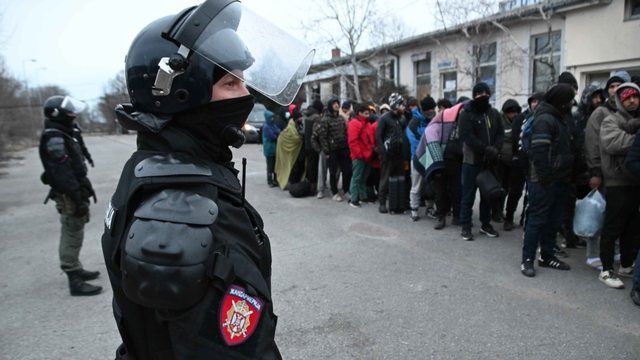
 Flash News
Flash News
Accident at "Shkalla e Tujanit", truck overturns in the middle of the road, driver injured
Vlora by-pass, work delays and cost increases
Milan are expected to give up on the transfer of Granit Xhaka
Inceneratori jashtë funksionit, përfshihet nga flakët fusha e mbetjeve në Elbasan
Accident on the Lezhë-Shëngjin axis, one injured

The European Union expressed on Monday its concern over the increase in the wave of illegal immigrants, who enter the EU through the territory of the Western Balkan countries, and unveiled a plan to address them.
According to the data possessed by the European Commission, only in October of this year, more than 22,000 illegal immigrants entered the EU through this route.
Compared to the same period last year, the figure represents an increase of 300 percent.
The statistics of Frontex - the European border guarding agency - show that in the first ten months of this year, over 281,000 illegal immigrants have entered the EU through the Western Balkans.
To face this phenomenon, the European Commission presented an action plan for the Western Balkans.
According to this plan, which was presented by the vice-president of the EC, Margaritis Schinas, and the commissioner for internal affairs, Ylva Johansson, the management of the borders with the countries of the Western Balkan region should be strengthened.
Also, quick access to the asylum system, capacity to accept refugees should be ensured, then the trafficking of migrants should be fought, readmission and repatriation agreements should be implemented, and the visa regime of the countries of the Western Balkans region should be adapted to that of the European Union.
In the EU, they say that a serious problem is the fact that in countries like Serbia, some citizens of third countries can enter without visas, and then they continue the illegal way to the European Union.
Serbia, a few weeks ago, has promised to restore the visas for the citizens of some countries, such as Burundi and Tunisia, while the European Commission expects Belgrade to take this step against some other countries as well.
The European Commission has called on all Western Balkan countries to adapt to the EU visa policy. On the contrary, he warned that the liberalization of visas that the EU has with most of the countries of this region is at risk.
"It is not acceptable that the countries of the region, which enjoy visa liberalization with the EU, allow their territory to be used for the illegal arrival of immigrants to the EU", said Schinas.
“Duhet t’i forcojmë kapacitetet e vendeve të rajonit të Ballkanit Perëndimor për të kontrolluar kufirin, duke i ndihmuar ato edhe përmes pranisë së BE-së në terren dhe përmes goditjes së rrjeteve të trafikimit të njerëzve”, shtoi ai.
Schinas, në mënyrë specifike, përmendi kontrollin e kufirit mes Serbisë dhe Hungarisë - vend anëtar i BE-së.
Aktualisht, BE-ja ka të shpërndarë rreth 500 zyrtarë të agjencisë Frontex në kufijtë mes BE-së dhe vendeve të Ballkanit Perëndimor. Por, Komisioni Evropian kërkoi që Frontex-i të ndihmojë edhe në kontrollin e kufijve mes vendeve të rajonit.
Johansson kërkoi që të gjitha vendet e Ballkanit Perëndimor, por edhe vendet anëtare të Bashkimit Evropian t’i regjistrojnë imigrantët që hyjnë në territoret e tyre.
Ajo tha se numri i kërkuesve të azilit është shumë më i lartë se numri i hyrjeve të regjistruara në kufijtë e jashtëm të BE-së.
Johansson, po ashtu, përmendi nevojën që Serbia sa më shpejt, ta përshtatë regjimin e vizave me atë të Bashkimit Evropian.
“Serbia po ndryshon politikën e saj me Tunizinë dhe Burundin, ka premtuar se këtë do ta bëjë edhe me Indinë... Shumica e atyre [imigrantëve ilegalë] që kanë arritur në BE, kanë ardhur përmes Serbisë”, tha Johansson, duke rikujtuar se obligimi për të përshtatur regjimin e vizave, vlen edhe për vendet e tjera të rajonit.
E pyetur nga gazetarët nëse ka raste të keqpërdorimit të hyrjes pa viza edhe nga vende të tjera, jashtë Serbisë, Johansson tha se “sa u përket ardhjeve masive, ato kanë ndodhur vetëm në rastin e Serbisë”.
Por, ajo shtoi se BE-ja duhet të jetë vigjilente edhe ndaj vendeve të tjera në të ardhmen, kur Serbia të rivendosë viza për shtete të caktuara dhe ardhjet të bëhen përmes vendeve të tjera të Ballkanit Perëndimor.
Nga gjashtë vendet e këtij rajoni, që nuk janë anëtare të BE-së, liberalizim vizash me bllokun evropian kanë: Shqipëria, Serbia, Mali i Zi, Maqedonia e Veriut dhe Bosnje e Hercegovina.
Kosova është e vetmja që nuk ka, por, javën e kaluar, zyrtarë të BE-së kanë miratuar një vendim që liberalizimi i vizave për qytetarët kosovarë të bëhet jo më vonë se më 1 janar të vitit 2024.
Rruga ballkanike ka vite që përdoret nga imigrantët ilegalë. Në vitin 2015, BE-ja është përballur me fluksin më të madh të të ardhurve në disa dekada.
Over 1 million people fleeing - mainly from wars and poverty in the Middle East and parts of Africa - have entered the countries of the European bloc, using different routes by sea and land, including the Balkan route.
Latest news








Golem and Qerret without water at the peak of the tourist season
2025-07-01 21:09:32

Euractiv: Italy-Albania migrant deal faces biggest legal challenge yet
2025-07-01 20:53:38
BIRN: Brataj and Fevziu victims of a 'deepfake' on Facebook
2025-07-01 20:44:00

Vlora by-pass, work delays and cost increases
2025-07-01 20:24:29



Milan are expected to give up on the transfer of Granit Xhaka
2025-07-01 19:41:25


The silent but rapid fading of the towers' euphoria
2025-07-01 18:58:07
Donald Trump's daughter says 'goodbye' to June with photos from Vlora
2025-07-01 18:48:47

Tirana vote recount, Alimehmeti: CEC defended manipulation
2025-07-01 18:15:05

Left Flamurtari, striker signs with another Albanian club
2025-07-01 17:43:14
Accident on the Lezhë-Shëngjin axis, one injured
2025-07-01 17:19:35
June temperature records, Italy limits outdoor work
2025-07-01 17:03:15

Meet Kozeta Miliku, named one of the top five scientists in Canada
2025-07-01 16:32:12
"Arsonist" arrested for repeatedly setting fires in Vlora (NAME)
2025-07-01 16:29:45

The ecological integrity of the Vjosa River risks remaining on paper
2025-07-01 16:09:40
Heat Headache/ Causes, Symptoms and Measures You Should Take
2025-07-01 16:01:13
UN: The world must learn to live with heat waves
2025-07-01 15:54:50

Three cars collide in Tirana, one of them catches fire
2025-07-01 15:38:16

Shehu: Whoever doesn't want Berisha, doesn't want the opposition 'war'!
2025-07-01 15:19:20
Berisha requests the OSCE Assembly: Help my nation vote freely
2025-07-01 15:11:46
Be careful with medications: Some of them can harm your sex life
2025-07-01 15:00:32

'Golden Bullet'/ Lawyers leave the courtroom, Altin Ndoc's trial postponed again
2025-07-01 14:44:52
EU changes leadership, Kosovo in a number of places
2025-07-01 14:40:01
Should we drink a lot of water? Experts are surprised: You risk hyponatremia
2025-07-01 14:30:20



Lëpusha beyond Rama's postcards: A village that is being silently abandoned
2025-07-01 13:41:56
Scorching temperatures in France close the Eiffel Tower
2025-07-01 13:29:35
Media: China, Iran and North Korea, a threat to European security
2025-07-01 13:20:12
Albania drops in global index: Less calm, more insecure
2025-07-01 13:09:35
Road collapses, 5 villages in Martanesh risk being isolated
2025-07-01 13:03:04

Këlliçi: Opposition action to be decided in September
2025-07-01 12:48:49
Four tips for coping with the heat wave
2025-07-01 12:38:53
Car hits pedestrian on Transbalkan road
2025-07-01 12:27:09
Authors of 9 robberies, Erjon Sopoti and Abdullah Zyberi arrested
2025-07-01 12:15:56

He abused his minor daughter, this is a 36-year-old man in custody in Fier
2025-07-01 11:50:34
The constitution of the Kosovo Assembly fails for the 40th time
2025-07-01 11:40:08




EU confirms support for the Western Balkans
2025-07-01 10:50:45
Serious in Fier! Father sexually abuses his minor daughter
2025-07-01 10:32:33
One year since the passing of the colossus of Albanian literature, Ismail Kadare
2025-07-01 10:25:26


They supplied the 'spaçators' with drugs, two young men are arrested in Tirana
2025-07-01 09:54:09
Europe is "scorching", how dangerous are high temperatures?
2025-07-01 09:48:56


Nigel Farage in Albania: but why?
2025-07-01 09:13:12
Xama: The "Partizani" dossier is quite weak and without facts!
2025-07-01 09:04:47

Foreign exchange, the rate at which foreign currencies are sold and bought
2025-07-01 08:35:39
Fabricators again warn of factory closures and job cuts
2025-07-01 08:21:30
Horoscope, what do the stars have in store for you today?
2025-07-01 08:08:59
Scorching hot, temperatures reaching 40°C
2025-07-01 07:57:12
Morning Post/ In 2 lines: What mattered yesterday in Albania
2025-07-01 07:42:59
Recount after May 11, Braho: I had no expectations for massive vote trafficking
2025-06-30 22:54:18

Second hearing on the protected areas law, Zhupa: Unconstitutional and dangerous
2025-06-30 22:18:46



Israel-Iran conflict, Bushati: Albanians should be concerned
2025-06-30 21:32:42

Fuga: Journalism in Albania today in severe crisis
2025-06-30 21:07:11
"There is no room for panic"/ Moore: Serbia does not dare to attack Kosovo!
2025-06-30 20:49:53

Temperatures above 40 degrees, France closes nuclear plants and schools
2025-06-30 20:28:42
Lavrov: NATO is risking self-destruction with new military budget
2025-06-30 20:13:54
Turkey against the "Bektashi state" in Albania: Give up this idea!
2025-06-30 20:03:24

Accused of sexual abuse, producer Diddy awaits court decision
2025-06-30 19:40:44


